Beans are seeds from the legume family, including kidney beans, black beans, pinto beans, navy beans, and many more. Cultivated for thousands of years, beans are a staple food in many cultures across the globe. They are prized for being nutritious, affordable, and versatile in cooking.
Beans are also known for their unique ability to fix nitrogen in the soil, making them an environmentally friendly crop that improves soil fertility and reduces the need for synthetic fertilizers.
Nutritional Benefits of Beans
Beans are incredibly rich in:
- Plant-based protein
- Complex carbohydrates
- Fiber
- Iron, magnesium, potassium, and folate
- Antioxidants and polyphenols
These properties make beans an ideal food for:
- Supporting heart health
- Stabilizing blood sugar levels
- Promoting gut health
- Boosting energy and endurance
- Maintaining muscle mass, especially in vegetarian and vegan diets
They are also naturally cholesterol-free and low in fat, making them beneficial for weight management.
Health Benefits and Disease Prevention
Regular consumption of beans is linked to a reduced risk of:
- Heart disease – thanks to fiber and plant sterols
- Type 2 diabetes – due to their low glycemic index
- Certain cancers, especially colon cancer, due to antioxidant content
- Obesity, as they promote satiety and reduce overeating
Beans also help regulate cholesterol and blood pressure due to their potassium and magnesium content.
Cooking and Digestibility
Beans can be cooked in many forms — soups, stews, salads, spreads, or patties. However, to reduce anti-nutrients like phytic acid and to improve digestibility, it’s recommended to:
- Soak beans overnight before cooking
- Rinse thoroughly before boiling
- Cook them long enough until they are soft
- Use herbs like cumin or fennel to reduce gas formation
Canned beans are also nutritious, though it’s best to choose low-sodium versions and rinse them before use.
Environmental and Economic Impact
Beans are:
- Low-emission crops, producing far fewer greenhouse gases than meat
- Water-efficient and suitable for sustainable agriculture
- Affordable and long-lasting in storage
They play a major role in global food security and are often promoted as a key solution to malnutrition and climate-resilient agriculture.
Glossary
- Legume – A type of plant with seed pods, including beans, peas, and lentils.
- Nitrogen fixation – A process where legumes enrich soil by converting atmospheric nitrogen into a usable form.
- Glycemic index – A measure of how fast a food raises blood sugar.
- Anti-nutrients – Natural compounds in food that can interfere with nutrient absorption.
- Satiety – The feeling of fullness and satisfaction after eating.


